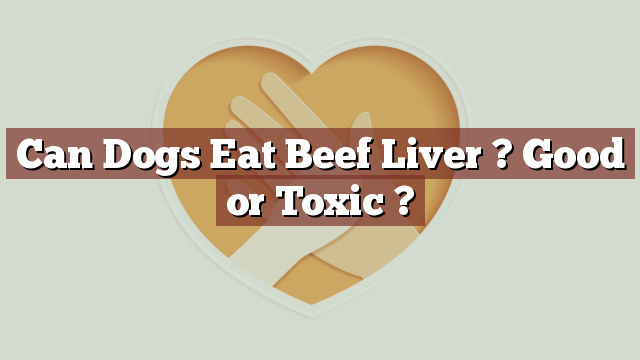Can Dogs Eat Beef Liver? Good or Toxic?
Knowing what foods are safe for our dogs to eat is essential for their health and well-being. As responsible pet owners, we must be cautious about the foods we offer to our furry friends. One such food that often raises questions is beef liver. In this article, we will delve into the nutritional value of beef liver for dogs, discuss its safety and potential risks, and provide expert advice on what to do if your dog consumes beef liver.
Nutritional Value of Beef Liver for Dogs: A Comprehensive Analysis
Beef liver is highly regarded for its rich nutritional content. It is a powerhouse of essential vitamins and minerals that can contribute to a dog’s overall health. This organ meat is an excellent source of protein, which is essential for the growth and maintenance of strong muscles. Additionally, beef liver contains significant amounts of vitamins A, B, and iron, all of which play crucial roles in supporting a dog’s immune system, promoting good vision, and maintaining healthy blood.
Can Dogs Eat Beef Liver? Unveiling the Truth about Safety and Toxicity
Yes, dogs can eat beef liver. In fact, it is often included in many commercial dog foods and homemade diets due to its nutritional value. However, moderation is key when feeding beef liver to dogs. While it is generally safe and beneficial, excessive consumption can lead to potential health issues.
It is important to note that beef liver should only be given to dogs in moderation. Excessive consumption can cause an overload of certain vitamins and minerals, such as vitamin A, which may lead to toxicity. Therefore, it is crucial to provide beef liver as part of a balanced and varied diet, rather than as the primary source of nutrition.
Potential Risks and Benefits of Feeding Dogs Beef Liver: A Balanced Perspective
Feeding beef liver to dogs comes with both potential risks and benefits. As mentioned earlier, the high concentration of vitamins and minerals can be beneficial for a dog’s overall health. However, the key lies in moderation. Overfeeding beef liver may result in vitamin A toxicity, which can cause symptoms such as loss of appetite, bone abnormalities, and even joint pain.
On the other hand, when appropriately portioned, beef liver can provide valuable nutrients to dogs. Its protein content supports muscle health, while vitamins A and B promote a healthy immune system and optimal organ function. It is important to strike a balance and offer beef liver as a treat or occasional addition to a well-rounded diet.
My Dog Ate Beef Liver, What Should I Do? Expert Advice and Guidelines
If your dog accidentally consumes beef liver or if you suspect they have had an excessive amount, it is crucial to monitor their behavior and health. In most cases, mild gastrointestinal upset, such as diarrhea or vomiting, may occur. However, it is always wise to seek professional advice from a veterinarian to assess the situation and determine the best course of action.
Experts recommend contacting your veterinarian immediately if you observe any concerning symptoms or if your dog has ingested a large quantity of beef liver. They will be able to provide guidance tailored to your dog’s specific needs and advise on any necessary steps to ensure their well-being.
In Conclusion: Is Beef Liver Good or Toxic for Dogs? Making an Informed Decision
In conclusion, beef liver can be a nutritious addition to a dog’s diet when fed in moderation. Its high protein content and valuable vitamins and minerals can support a dog’s overall health and well-being. However, excessive consumption can lead to vitamin A toxicity, potentially causing adverse health effects. It is crucial to strike a balance and offer beef liver as part of a well-rounded diet, ensuring it does not make up the majority of their food intake. As always, consulting with a veterinarian and following their guidance is essential to make informed decisions about your dog’s dietary needs and overall health.
Thank you for investing your time in exploring [page_title] on Can-Eat.org. Our goal is to provide readers like you with thorough and reliable information about various dietary topics. Each article, including [page_title], stems from diligent research and a passion for understanding the nuances of our food choices. We believe that knowledge is a vital step towards making informed and healthy decisions. However, while "[page_title]" sheds light on its specific topic, it's crucial to remember that everyone's body reacts differently to foods and dietary changes. What might be beneficial for one person could have different effects on another. Before you consider integrating suggestions or insights from "[page_title]" into your diet, it's always wise to consult with a nutritionist or healthcare professional. Their specialized knowledge ensures that you're making choices best suited to your individual health needs. As you navigate [page_title], be mindful of potential allergies, intolerances, or unique dietary requirements you may have. No singular article can capture the vast diversity of human health, and individualized guidance is invaluable. The content provided in [page_title] serves as a general guide. It is not, by any means, a substitute for personalized medical or nutritional advice. Your health should always be the top priority, and professional guidance is the best path forward. In your journey towards a balanced and nutritious lifestyle, we hope that [page_title] serves as a helpful stepping stone. Remember, informed decisions lead to healthier outcomes. Thank you for trusting Can-Eat.org. Continue exploring, learning, and prioritizing your health. Cheers to a well-informed and healthier future!

